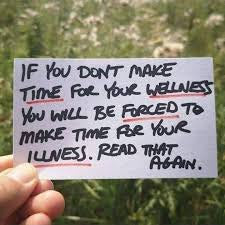The saying, "If you don't make time for your wellness, you will be forced to make time for your illness," encapsulates a profound truth about the importance of prioritizing self-care and well-being in our lives. In today's fast-paced world, where demands are high, and time seems scarce, it's easy to overlook our health in pursuit of other priorities. However, neglecting our wellness can have significant consequences, both personally and professionally.
At its core, this quote highlights the essential connection between self-care and overall health. Wellness encompasses not only physical health but also mental, emotional, and spiritual well-being. When we neglect to make time for activities that nourish and replenish us, such as exercise, relaxation, and self-reflection, we put ourselves at risk for illness and burnout.
Physically, failing to prioritize wellness can lead to a range of health problems, from chronic diseases like heart disease and diabetes to more immediate concerns like fatigue and weakened immune function. Without proper nutrition, exercise, and rest, our bodies become more susceptible to illness and injury. Over time, neglecting our physical health can lead to long-term consequences that impact our quality of life and lifespan.
Mentally and emotionally, neglecting wellness can manifest as stress, anxiety, depression, and other mental health issues. In today's hyper-connected world, where we are constantly bombarded with information and stimuli, it's essential to take time for mental and emotional self-care. Practices like mindfulness meditation, journaling, and therapy can help us manage stress, process emotions, and maintain a positive outlook on life.
Moreover, neglecting wellness can impact our relationships and social connections. When we are overwhelmed and depleted, we may find it challenging to show up fully for our loved ones and engage in meaningful social interactions. Over time, this can strain our relationships and lead to feelings of isolation and loneliness, which are detrimental to our mental and emotional well-being.
Spiritually, neglecting wellness can result in a loss of meaning, purpose, and connection to something greater than ourselves. Whether through religious or spiritual practices, nature walks, or creative pursuits, it's essential to nurture our spiritual well-being and cultivate a sense of purpose and fulfillment in life. Without this connection, we may feel adrift and disconnected from our true selves.
In the professional sphere, neglecting wellness can also have significant consequences. Burnout, absenteeism, and decreased productivity are common outcomes of chronic stress and overwork. Employers are increasingly recognizing the importance of promoting employee well-being to foster a healthy and productive work environment. Initiatives such as flexible work schedules, wellness programs, and mental health resources can help employees prioritize their well-being and thrive in the workplace.
Ultimately, the quote "If you don't make time for your wellness, you will be forced to make time for your illness" serves as a powerful reminder of the importance of self-care and well-being in our lives. By prioritizing our physical, mental, emotional, and spiritual health, we can prevent illness, enhance our quality of life, and cultivate resilience in the face of life's challenges. It's not just about avoiding illness; it's about embracing wellness as a foundation for living our best lives.


.jpg)
.jpg)


